Golden Retrievers are known for their loving and loyal nature. However, anyone who has ever owned a dog probably knows firsthand about their unbridled energy. From hyperactive running to constant chewing and jumping, many owners wonder, “When do Golden Retrievers calm down?”
The good news: this energy doesn’t last forever; it takes time, patience, and understanding to get through the wild puppy and adolescent phases. Golden Retrievers are naturally outgoing and playful, but their calm maturity develops with age, training, proper care, and mental stimulation.
In this guide, we’ll discuss the key behavioral phases during which most Golden Retrievers become more even-tempered, and how you can help your pup become a calmer, more even-tempered companion. We’ll also show you how grooming, diet, exercise, and routine can have a surprising impact on your Golden Retriever’s energy levels. Let’s decode the chaos and restore calm—one tail wag at a time.
Contents
- 1 Understanding Energy Levels and Golden Retriever Behavior by Age
- 2 When Do Golden Retrievers Calm Down? Real Milestones and What to Expect
- 3 Are Golden Retrievers Naturally Calm or Are They Trained?
- 4 Signs Your Golden Retriever Is Starting to Calm Down
- 5 Nutrition, Health & Their Role in Energy Levels
- 6 Grooming and Calming: Why They’re More Connected Than You Think
- 7 Final Thoughts: Your Golden Retriever Will Calm Down – Patience Pays Off
Understanding Energy Levels and Golden Retriever Behavior by Age
Golden Retrievers go through different stages of development, each with their own unique behavior patterns and energy levels. Understanding what is normal at each stage will help you better manage your expectations and stay patient when your sweet pup is acting more like a tornado than a teddy bear. We break down development by age so you can understand when your Golden Retriever is most likely to calm down and what behaviors are associated with that.
Puppy Stage (8 weeks to 6 months)
This is the stage of greatest chaos. Your Golden Retriever puppy is learning about the world, and everything becomes a chew toy or an opportunity to blow off steam. Expect:
- Continuous energy bursts, sometimes referred to as “zoomis”
- Teething behavior
- Sleeping and jumping
- Fickle concentration and obedience
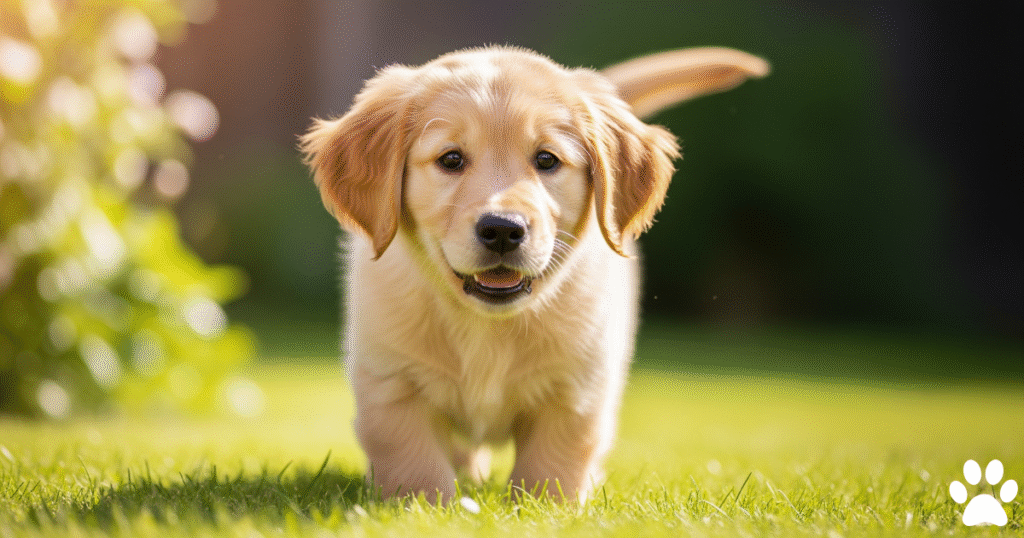
Puberty (6 months to 2 years)
Welcome to puberty — your Golden Retriever is testing boundaries like a pro. He now has the strength and speed of an adult dog, but still retains the attention span of a puppy. Common Behaviors:
- Jumping or pulling on the leash
- Selective listening to commands
- More assertive behavior with other pets or strangers
- Losing attention during training
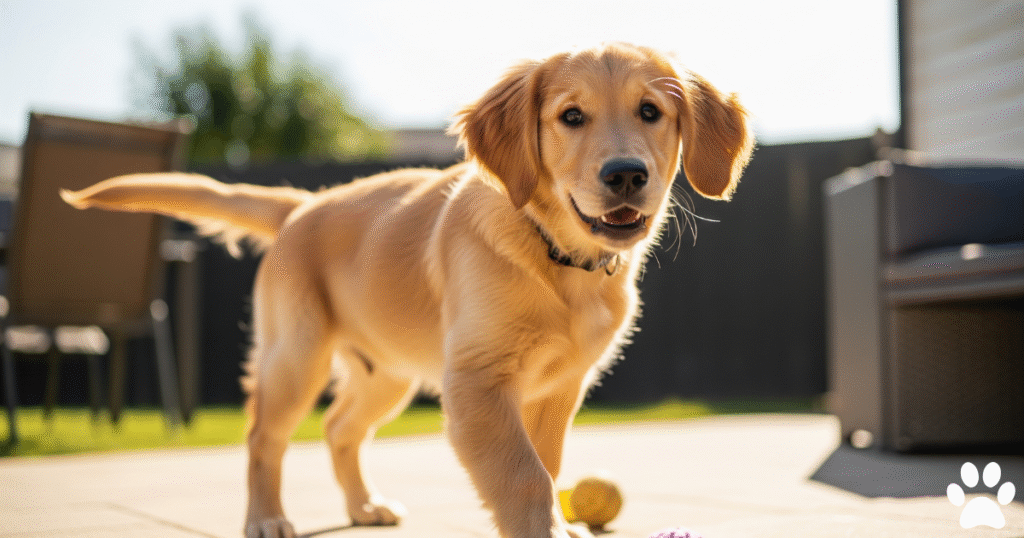
Adulthood (2 to 5 years)
Around 2 to 3 years of age, most Golden Retrievers begin to calm down. You will notice the following:
- Better impulse control
- More predictable behavior
- Less destructive tendencies
- Calmer behavior in the house
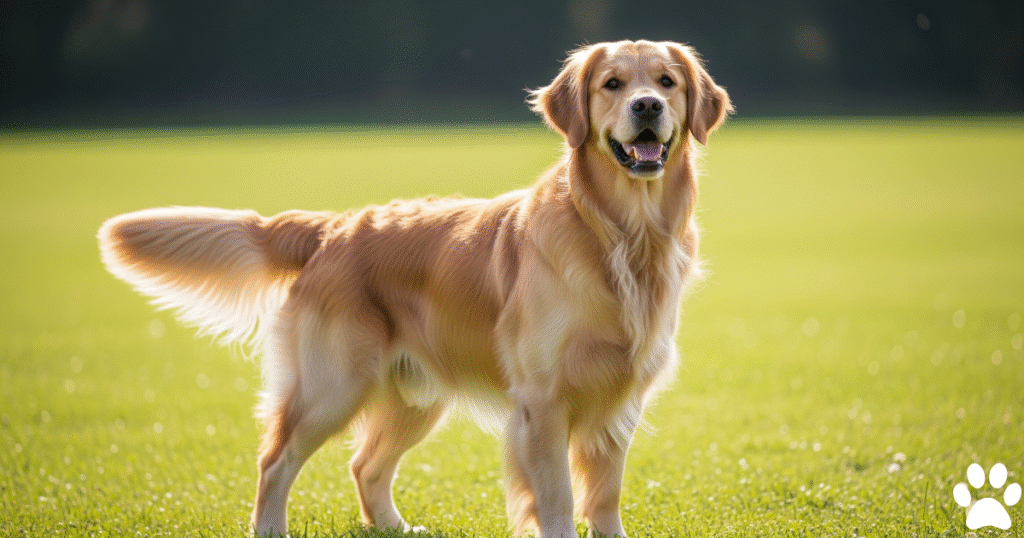
Seniors (6 years and up)
As Golden Retrievers age, they often become calm, laid-back companions. During this period, their energy levels drop significantly, and they prefer quieter activities, leisurely walks, and quiet company. However, don’t confuse age with lack of interest—your senior Golden Retriever still needs mental stimulation and love to stay healthy and happy.
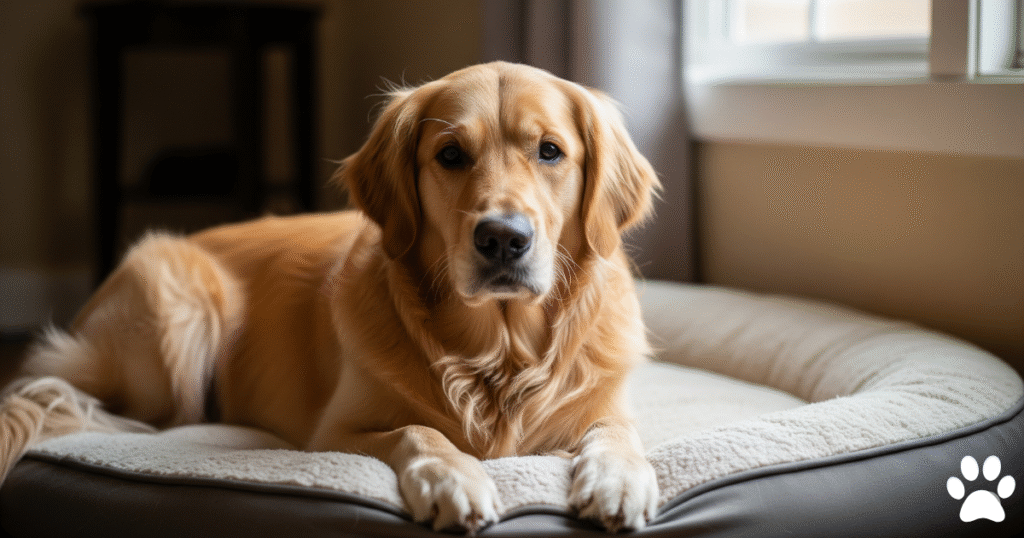
When Do Golden Retrievers Calm Down? Real Milestones and What to Expect
If you’re raising a boisterous, energetic Golden Retriever, you’ve probably wondered (or begged), “When do Golden Retrievers calm down?” The short answer: Usually between 2 and 3 years of age. The long answer: It depends on personality, environment, consistent training, and even genetics.
Golden Retrievers don’t suddenly go from hyper to calm. Instead, their energy levels gradually decrease, like turning off the lights, as they reach developmental milestones and mature emotionally.
Calming Down Milestones
Most owners can expect the following at different stages:
6–12 months:
The puppy still has a lot of energy, but some Golden Retrievers respond better to training. Teething is slowing down, but energy levels are at their peak.
1-2 years:
Beginning to puberty – still active, but beginning to develop better impulse control with a consistent structure.
2-3 years:
This is the ideal time for most Golden Retrievers to settle down. They’re not lethargic, but the constant chaos is gone.
4 years and up:
Golden Retrievers are becoming more emotionally mature. They still love to have fun, but they also know when to relax.
6 years and up:
Calm, relaxed, and even-tempered – your Golden Retriever is now acting like the wise old soul everyone talks about.
Personality, routine, and environment also play a role
While age plays a big role, some Golden Retrievers are just wired differently. A puppy with natural energy may take longer to settle down, while others are calm from day one. Daily structure, socialization, and physical/mental exercise will affect how quickly your dog matures.
- Factors that can hinder calm behavior include:
- Lack of exercise or play
- Inconsistent training or lack of clear rules
- Poor nutrition or overstimulation
- Boredom or lack of mental stimulation
Dogs that are regularly walked, played with, and have boundaries set calm down faster and stay balanced. Routine is key. When a Golden Retriever knows what to expect each day, he feels more secure, confident, and less likely to misbehave.
Are Golden Retrievers Naturally Calm or Are They Trained?
Golden retrievers are often regarded as one of the most calm and family-friendly dog breeds. They are often portrayed as naturally well-behaved, calm, and obedient. But is this calmness actually innate — or is it the result of proper training? The honest answer? It’s a combination of temperament and training.
Their Natural Temperament: Friendly, Enthusiastic, and Sociable
Golden Retrievers were bred to be friendly, intelligent, and easy-going, making them naturally less aggressive and more adaptable than many other breeds. Their calm nature comes from generations of hunting and companion dogs that required focus, patience, and cooperation.
Yes, many Golden Retrievers are naturally calm, especially as they age. They are less prone to aggression, more affectionate, and enjoy human company and comfort. But… their natural calm doesn’t mean your Golden Retriever won’t drive you crazy from time to time.
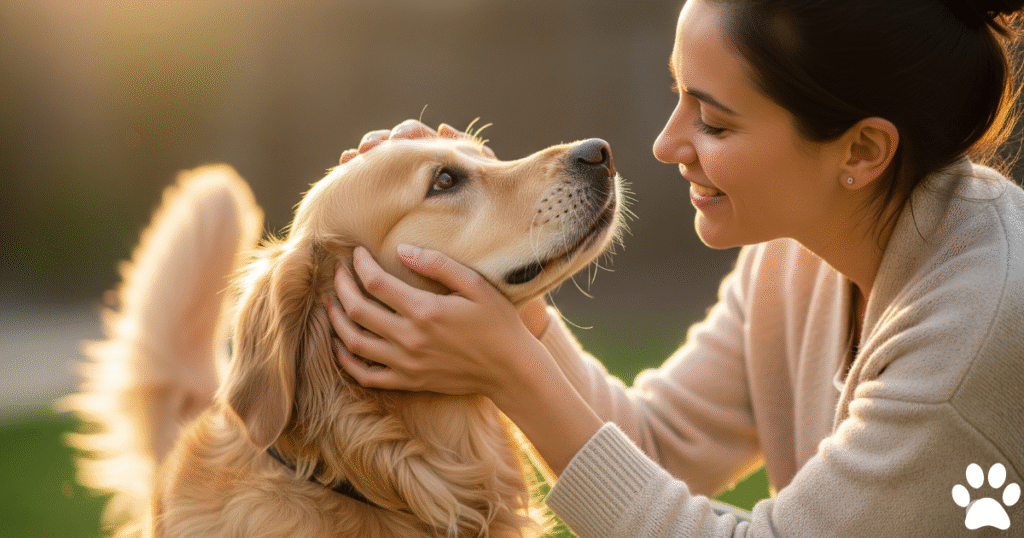
Why Training Is Still Important – Very Important
Even calm dogs need guidance, structure, and boundaries. A Golden Retriever who is underachieved, untrained, or constantly overstimulated (such as from lack of routine, too much alone time, or poor leash behavior) will become restless, hyperactive, or even destructive.
Their intelligent minds crave challenges, and without mental stimulation, they will invent their own games, like digging in the garden or eating on the couch. Even if your dog has a calm temperament, consistent training, daily routines, exercise, and grooming will really bring them out in the open.
Signs Your Golden Retriever Is Starting to Calm Down
As your Golden Retriever grows, there are subtle (and not so subtle) signs that your lively, energetic puppy is finally settling down. These behavioral changes are a huge relief for many owners who have left the hustle and bustle of puppyhood and adolescence behind. But how do you know when your Golden Retriever’s energy is waning? Let’s look at some key signs.
From Hyperactive to Chilled – What to Look For
Here are some clear signs that your Golden Retriever is calming down:
- Fewer panicky greetings – Instead of jumping and spinning around, they may calmly approach visitors or sit on command.
- More naps – You’ll notice longer rest periods, especially during the day.
- Less reactive – They’re less likely to bark at every doorbell or chase squirrels.
- Improved concentration – They respond better to training and commands, even in distracting environments.
- Less destructive biting – They are more likely to chew on toys than your shoes.
Daily behavioral changes that indicate maturity
Behavioral changes don’t happen overnight, but gradually manifest themselves in daily routines:
- They walk more calmly on the leash, instead of pulling or lurching.
- They can be left alone without causing a fuss – no excessive barking, chewing, or anxiety.
- They wait patiently at the door, for food, or during grooming.
- They enjoy relaxing quietly at your feet or in their favorite spot in the sun.
How to Help Your Golden Retriever Calm Down Faster
As your Golden Retriever ages, he or she will naturally become calmer. However, there are ways to speed up the process through targeted training, appropriate exercise, and a structured lifestyle. These methods are especially helpful during the chaotic puppy and teenage years, when your Golden Retriever’s energy seems endless. Here’s how to help your Golden Retriever calm down faster.
Exercise is Key
A Golden Retriever that is exhausted is a good one. Because they were bred to be energetic, these dogs require at least one to two hours of exercise daily to release stored energy. Jumping up during walks or playtime often leads to hyperactivity, chewing, or barking. Try a combination of:
- Long walks or runs
- Fetch or tug-of-war
- Swimming (one of Golden Retrievers’ favorite activities!)
- Hiking or agility classes
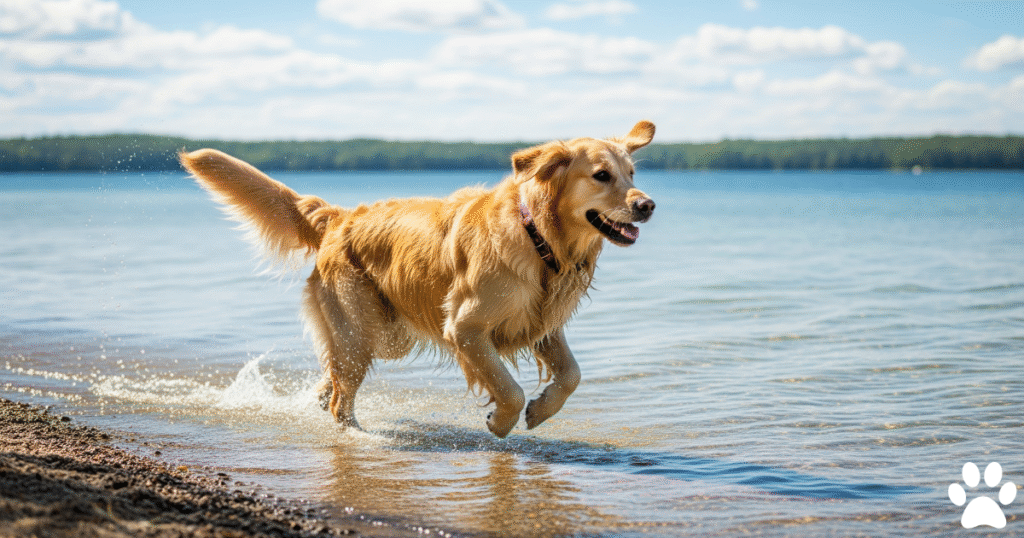
Mental stimulation reduces agitation
Golden Retrievers are incredibly smart. Without mental stimulation, they become bored and fed up with unruly dogs. Keep their minds busy with:
- Puzzles and treat games
- Scent Games
- Beginner and advanced obedience training
- Teach them new tricks or commands (Golden Retrievers love to help!)
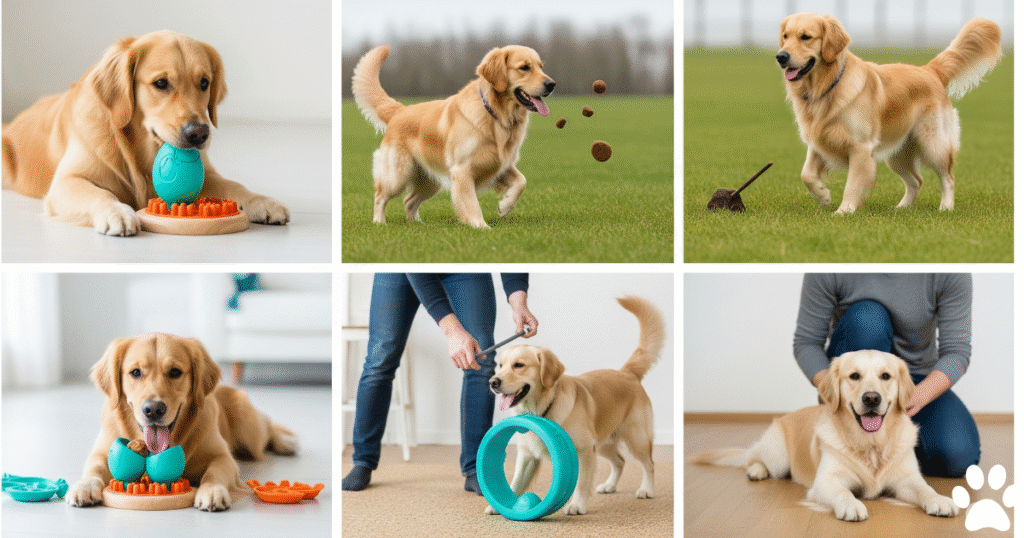
Just 15 to 30 minutes of mental stimulation a day can have the same calming effect as a long walk. It increases concentration, releases excess energy, and reduces attention-seeking behavior.
Create a calming routine with structure
Golden Retrievers thrive on routine. When they know what to expect—walks, food, sleep, play—they feel more secure and behave better. Tips for a calming structure:
- Feed, walk, and exercise at the same time each day.
- Schedule regular naps or “quiet times.”
- Reward composure with sweets or praise.
- Avoid overstimulation (reduce loud noises and chaotic environments).
Nutrition, Health & Their Role in Energy Levels
It’s easy to overlook the connection between your Golden Retriever’s behavior and his physical health, but diet and health play a crucial role in how energetic or hyperactive he may be. If you’re wondering when your Golden Retriever calms down but your pup seems to be running at full speed, it may be time to take a closer look at his diet and health.
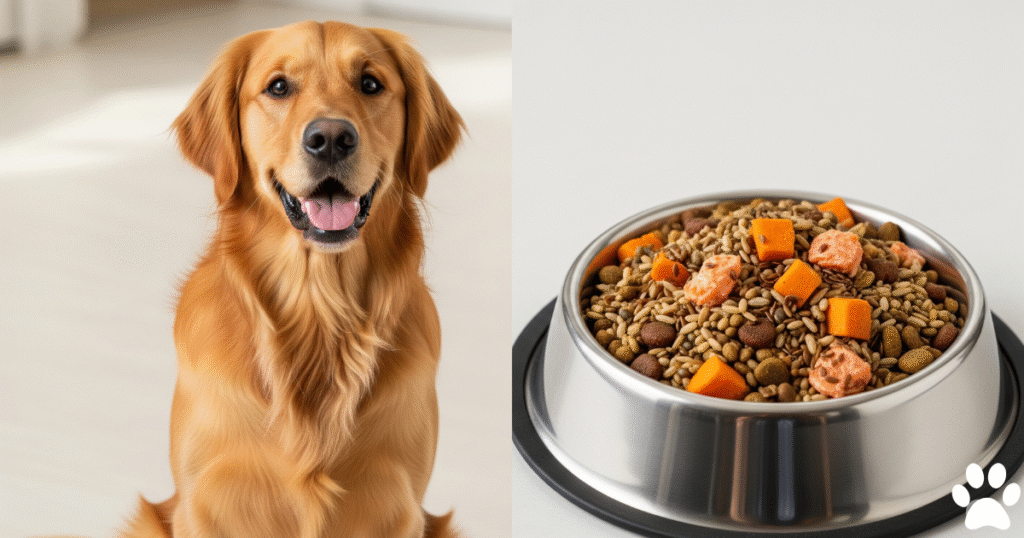
The Effect of Diet on Calmness and Behavior
Just as too much sugar can make children hyperactive, poor-quality dog food can make your Golden Retriever hyperactive, restless, or unfocused. Look for a food that:
- Contains adequate protein and complex carbohydrates (like brown rice or sweet potato)
- Contains no artificial coloring, corn, or soy fillers.
- Contains omega-3 fatty acids (from salmon or flaxseed) to support brain function
- Adds vitamins and minerals to balance energy levels and promote development
You may also want to consider natural calming supplements (as recommended by your vet), such as chamomile oil, L-theanine, or CBD for dogs, especially during stressful times. A well-nourished Golden Retriever will be a more focused, balanced, and calm companion.
Medical Issues That Can Increase Hyperactivity
If your Golden Retriever seems more hyper than usual despite exercise, routine, and training, there may be a medical issue. Watch for:
- Thyroid problems (common in Golden Retrievers)
- Digestive problems or food allergies
- Joint pain that results in screaming or restless pacing
- Anxiety, which can be caused by injury, separation anxiety, or lack of socialization
Unusual behavior can be ruled out by a veterinarian examination. Remember: sometimes hyperactivity is a cry for help, not just a behavior problem. If your Golden Retriever is physically healthy, he will be much calmer and more trainable.
Grooming and Calming: Why They’re More Connected Than You Think
You may not think of grooming as a behavior management tool, but for golden retrievers, regular grooming is about more than just cleanliness—it’s an opportunity to build trust, instill calm, and reinforce positive behavior. Let’s look at how grooming can help your golden retriever calm down physically and emotionally.
Grooming as a Calming Ritual
Many dogs, especially golden retrievers, find comfort in physical contact, and grooming provides a great opportunity to do so. Regular grooming can:
- Calm your dog with rhythmic strokes
- Recreate the calming effects of a massage
- Strengthen the bond between you and your dog
- Make your Golden Retriever more tolerant of touching in general (ears, paws, tail, etc.)
Over time, this ritual can teach your dog to associate grooming with safety and relaxation. Even the most active Golden Retrievers will often lie down or take a nap during a slow, gentle brushing session. And yes, brushing can be part of your daily or weekly relaxation routine, especially in the evening.
How to Create a Relaxing Grooming Routine
A relaxing brushing routine starts with proper preparation. Here’s how to make brushing relaxing, not stressful:
- Pick a place where there aren’t many distractions.
- For delicate regions in particular, use grooming gloves or soft brushes.
- Use a soft, soothing voice and reward calm behavior with treats.
- Keep sessions short and frequent—quality over quantity.
- Use calming sprays or scents for dogs (like vet-recommended lavender).
Consistency is key. Incorporating brushing into your Golden Retriever’s predictable routine will promote calm behavior overall—not just during brushing, but throughout the day. And remember: When do Golden Retrievers calm down? They tend to calm down faster in a home where brushing is part of their love language.
Final Thoughts: Your Golden Retriever Will Calm Down – Patience Pays Off
If you’re feeling overwhelmed by your Golden Retriever’s energy, remember: He will calm down – and it’s worth the wait. Golden Retrievers are naturally affectionate and intelligent, but they also go through periods of high energy that can test even the most patient owners. The good news: With age, training, structure, and love, your Golden Retriever will become a calm, loyal companion.
Most Golden Retrievers begin to calm down between the ages of two and three, but every dog is different. Some calm down sooner, while others retain their playful puppy nature well into adulthood. What really speeds up the process is your commitment – exercise, routine, mental stimulation, healthy food, and grooming. The wild puppy years don’t last forever. In return, you’ll get a dog who’ll not only behave better, but who’ll also be the gentle, even-tempered friend you’ve always dreamed of. So be persistent. Celebrate the small successes. And trust that the calmest chapter in your golden’s life is still ahead, despite his wagging butt. Follow for more information on When Do Golden Retrievers Calm Down!
Featured Blogs

The Ultimate Golden Retriever Grooming Guide: Tips for a Healthy and Happy Coat
The Golden Retriever is known for its flowing, thick, soft golden coat. Golden Retriever Grooming is important for its overall...
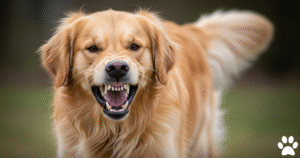
Aggressive Golden Retriever: Understanding, Managing, and Training Your Dog with Care
Golden Retrievers are known for their loving, gentle, and loyal nature. So it can be shocking and confusing when a...
Dr. Nabeel A.
Hi, I’m Dr. Nabeel Akram – a farm management professional by trade and a passionate Golden Retriever enthusiast at heart. With years of experience in animal science and livestock care, I’ve built a career around understanding animals—how they live, thrive, and bring value to our lives. This blog is a personal project born from that same passion, focusing on one of the most loyal and lovable breeds out there: the Golden Retriever. Whether I’m managing farm operations or sharing insights on canine health, behavior, and care, it all ties back to one core belief—animals deserve thoughtful, informed, and compassionate attention. Welcome to a space where professional expertise meets genuine love for dogs.
Facebook |
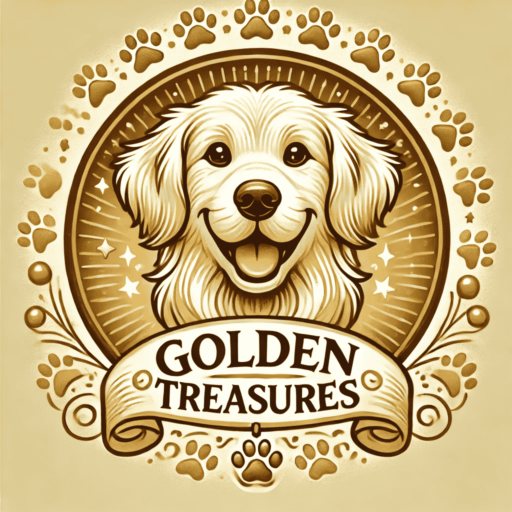
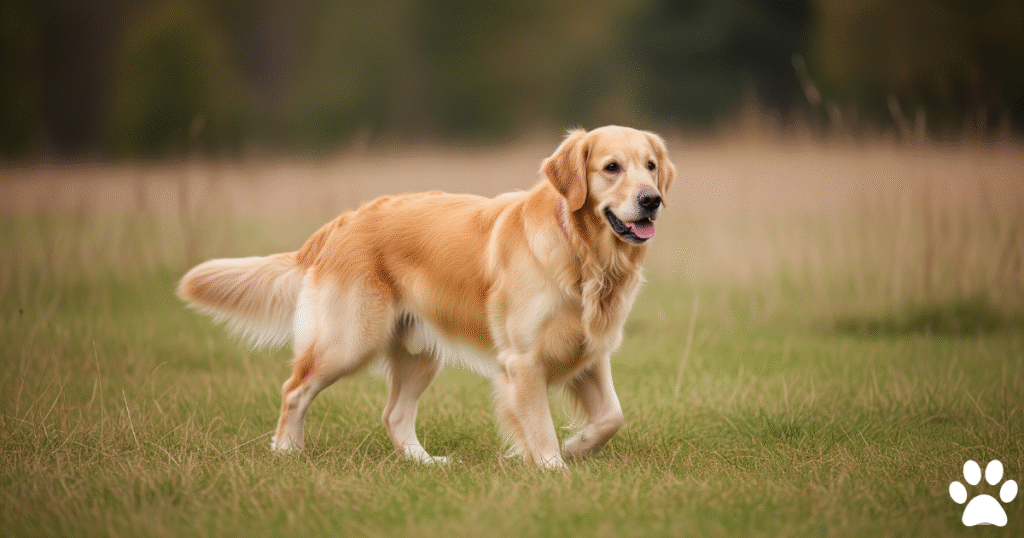
Links will be automatically removed from comments.